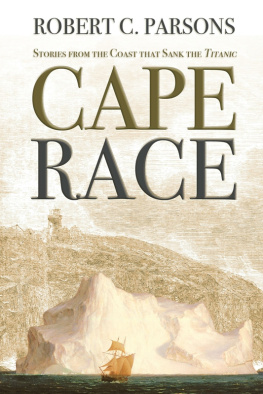Shipwrecks off the East Coast
Harrowing Tales of Rescue and Disaster
Carmel Vivier
Formac Publishing Company Limited
Halifax
To my sons, Andr and Stefan, for believing it could happen.
Prologue
Captain Reed watched in horror as more people threw themselves from the burning vessel. It was a terrible sight, made all the more surreal by the circus animals that were jumping in tandem with the panicked passengers. Horses and camels were being coaxed off the ship by their desperate handlers in the hopes they would swim to shore once they hit the water.
While each of the circus workers did their best to get the larger animals off the ship, there was one creature that couldnt be controlled. Mogul, the elephant, ran up and down the deck of the Royal Tar , trumpeting in terror as the flames continued to engulf the vessel. From his position on the lifeboat, Captain Reed could hear the elephants cries well above those of the passengers. Suddenly, the captains eyes widened in dread as the elephant launched himself off the boat, aiming straight for a raft full of people below.
Chapter 1
The Arcana
Some ships, it seems, are simply fated to have problems. No matter who might own them, or who might sail them, misfortune and disaster just keep following these unfortunate vessels around. One such vessel was the Arcana , a three-masted schooner with a long history of bad luck.
Before she became the Arcana , this schooner was christened the Jefferson Borden , named after a prominent citizen of Fall River, Maine. Built in 1867 by David Clark of Kennebunk, Maine, she had a net tonnage of 533.39 and was 142 feet long. She was owned by her first commander, Captain Lemuel Hall, as well as several other shareholders, and claimed Boston as her homeport.
Scarcely three years after her launch, the Jefferson Borden was caught in an exceptionally violent October gale that hammered the shipping lanes off the coast of Florida. Captain Hall tried to steer the ship to safety, but the storm had sprung up so quickly that he and the crew were trapped in the middle of it before realizing just how severe it was. Unable to escape the weather, they did their best to ride it out. They managed to release the deck cargo, hoping to lighten the ships load, but the fierce wind and enormous waves soon damaged her rudder and tattered her sails, and there was little else the crew could do as the storm drove them closer and closer to the shoreline.
Captain Hall and his men braced themselves for the impact as the Jefferson Borden was swept through the crashing surf and slammed against the shore. A horrible tearing sound could be heard above the roar of the storm as the ships hull was ripped open, spilling part of her remaining cargo into the sea.
Surveying his severely damaged vessel, Captain Hall knew hed been lucky to make it to shore with only a few crew members injured. A short distance down the coast from where the Jefferson Borden lay stranded, the captain could see another ship, also grounded and laying completely on her side. As it turned out, 11 other ships were run aground in the vicious storm. The Florida coastline was strewn for over 80 kilometres with wrecked vessels, lost cargo, and debris.
After the Jefferson Borden s beaching, her hull was auctioned off for $50 to the Tift brothers, Asa and Charles, of the Florida Keys. The brothers then scraped together enough money to fix and recondition the schooner, but they quickly realized that in order to finance their new business venture, they would have to take on partners. Soon, Captain William M. Patterson from Edgecomb, Maine, bought up half the ships shares, while George E. Towne of Boston purchased a quarter. This left the Tift brothers with only a quarter interest in the vessel.
Back at the Jefferson Borden s homeport of Boston, Captain Patterson put together a new crew for the schooner. He recruited his brother, Corydon Trask Patterson, as first mate, and his cousin, Charles Patterson, as second mate. Soon after the crew was assembled, the owners obtained shipping contracts to carry cargo from Boston and New Orleans to London, England.
In late March 1875, five years after her refitting, the Jefferson Borden was on one of her regular voyages to London from New Orleans, her hold packed with a cargo of cottonseed oil cake, when the black cloud of disaster struck again. The schooner, overloaded and short one crew member, ran into a bad storm. As violent winds came from all directions and the waters churned ferociously, the Jefferson Borden was helplessly tossed about, swamped by rogue waves crashing over her deck. The weather was so heavy that the casks lashed to the deck and holding the crews only drinking water were at times submerged in the sea.
Just as they managed to sail out of the storm, and just when the crew figured nothing else could go wrong, more bad luck struck: the ship sprung a leak. This meant that someone had to man the pump at all times, leaving crew members standing duty for up to 36 hours straight.
The long hours and tense atmosphere instigated a rumbling of discontent among the men. They were tired and frustrated. Lack of sleep, small food rations, and tainted drinking water made them an unpredictable bunch. When one of the crew, Ephraim Clark, refused a direct order from Captain Patterson to empty the water casks and help clean up the debris on the deck, the captain reached his limit of patience and punished Clark for insubordination. Clark, who had been a troublemaker from the very start of the voyage, persuaded two of the other crew members, George Millar and John Glew, to help him take over the ship in retaliation.
At midnight on April 20, the small group took action. It was the second mates watch, which meant both the first mate and the captain would be in their quarters and were unlikely to interfere. Clark cut the schooners foresheet, creating a problem that would require immediate attention. As Second Mate Charles Patterson approached the sail, Clark and Millar hit him from behind with a piece of block tackle and threw him overboard.
Meanwhile, First Mate Corydon Patterson was having a hard time sleeping and decided to join his cousin for a smoke. Shortly before 1 a.m., as Corydon Patterson stood asking Millar where his cousin had gone, he was attacked by Clark from behind. With several swift stabs from a marlinespike, Clark killed the first mate and, with help from Glew, hurled his body into the sea.
Approximately one hour later, Captain Patterson left his quarters. He had made it a habit to take a walk and check on his ship each night around 2:30 a.m. Though he trusted his officers implicitly, he wasnt so sure about his crew their lack of discipline made him anxious. The captain had the added burden of having his wife, Emma, on board for this particular voyage, and concern for her safety made him extra cautious.
As he set out on his customary walk, Captain Patterson quickly discovered that both his cousin and his brother were missing. Sensing something was terribly wrong, he quietly slipped back to his quarters, woke Emma, and ordered her to get dressed and be ready for anything. Then, going out on the deck again, he called forward to the crew, asking the whereabouts of the missing officers. Millar tried to trick the captain into going to the bow of the vessel, but Emma, being very intuitive, cautioned her husband to stay close by.
The captain wasnt sure what was going on, but suspected that, with both his brother and cousin missing, his command of the ship was in jeopardy. It appeared that Clark, Millar, and Glew were attempting a mutiny, and he needed to get control of the situation quickly. Finding someone other than his wife whom he could trust was his next plan of action. That someone was the steward, Albert Aiken. When awakened by Captain Patterson, Aiken quickly showed his loyalty by arming himself and the captain with revolvers and setting aside a double-barreled shotgun as a weapon of last resort.
Next page







